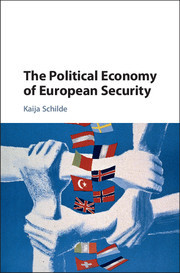Description
The Political Economy of European Security
Author: Schilde Kaija
Looks at how EU political institutions in security and defense have developed through the political economy of interest group intermediation.
Language: English
Subject for The Political Economy of European Security:
Approximative price 39.35 €
In Print (Delivery period: 14 days).
Add to cart
The Political Economy of European Security
Publication date: 01-2020
Support: Print on demand
Publication date: 01-2020
Support: Print on demand
Approximative price 107.81 €
In Print (Delivery period: 14 days).
Add to cart
The Political Economy of European Security
Publication date: 09-2017
Support: Print on demand
Publication date: 09-2017
Support: Print on demand
Description
/li>Contents
/li>Biography
/li>
What is the relationship between private actors and international institutions in global governance, as institutions such as the EU develop aspects of political authority once in the sole domain of nation states? Important areas of recent EU development have been immigration, security, and defense policies. Are these EU policies the result of strategic imperatives, or are they also driven by the political economy of markets? Kaija Schilde argues that answers require evaluating the EU in the comparative tradition of the political development of authority. Drawing on industry documents, interviews, interest group data, an original survey, and comparative political theory, The Political Economy of European Security demonstrates that interest groups can change the outcomes of developing political institutions because they provide sources of external capacity, which in turn can produce authority over time. In this way, the EU is like a developing state in its relationship with interest groups.
Introduction; 1. The governing capacity of the European Union; 2. Mr. Smith goes to Brussels; 3. How Weberian is the EU?; 4. The political economy of European defense; 5. The political development of EU defense; 6. The political development of EU security; 7. The blurring of European security and defense.
Kaija Schilde is an Assistant Professor of political science at the Boston University Pardee School of Global Studies.
© 2024 LAVOISIER S.A.S.




